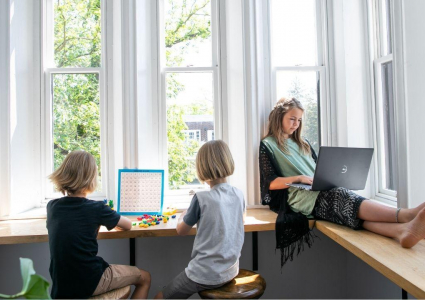Homeschooling Little Ones

Listen on Apple Podcasts | Listen on Spotify
Are you or someone you know deep in the trenches of toddlerhood and trying to balance teaching your big kids at the same time?
Lexi Detweiler is here to chat about how you can make a one-room schoolhouse model work, how to actually get things done, and how spending time with young siblings can even be an education in itself for your big kids!
Episode Transcription
Note: This transcription may vary from the words used in the original episode.
Laurie Detweiler:
Welcome to Veritas Vox, the voice of Classical Christian education. And I'm Laurie Detweiler, and I'll be your host today. And joining me is Lexi Detweiler, my daughter-in-law. She is married to my third son, Travis, and she homeschools three of their children and my grandchildren. So she's becoming what I consider to be an expert in this area and what you're on this journey. And I'm glad to have her with me today.
And today we're going to be talking about something that she is intimately familiar with at this point in her life, and that is homeschooling with a toddler. That is a question that we always seem to get asked on blogs, on Facebook. When I'm at conferences, I have moms coming up to me in tears saying I have no idea how to do this.
And I can tell you, it is something that you have to plan for and think about ahead of time because it's not easy. As I started my homeschooling journey and then as I look back on just my teaching, one of the things that I realized is that homeschooling is not a whole lot different than a one-room schoolhouse.
And so teachers have always been learning to juggle. And really, it is it's a juggling act–children. And having toddlers just makes it that much more difficult to do. And so I'm going to turn it over to Lexi now and let her tell you a little bit about her family. In case you haven't joined us before, where we've talked about their families. So you can understand a little bit why I think she's an expert in juggling toddlers.
Lexi Detweiler:
Thanks, Laurie. Yeah, I have three kids. My oldest, Ava, is eight years old. And then I have Oliver, who's almost six, and Lucy who's four. I started homeschooling when Ava was going into kindergarten, so at that time I had a three-year-old and a one-year-old, so I did have the two toddlers at home with me. I've been homeschooling since. So I've been through kindergarten, first and second grade. This year, Oliver was doing kindergarten, and then I have Lucy, who I was doing like a preschool type of thing with her this year. On top of that, I also have some animals in my house, which kind of complicates things a little bit. I have two dogs, a pig, chickens, a lizard, and a cat all over the house.
Laurie Detweiler:
Can’t forget Lizzie!
Lexi Detweiler:
The easiest one, she's like, is a lizard, a leopard gecko. So yeah, throwing all those things into the mix really makes it a very lively house. And homeschooling in a very lively house is fun, but it also has its challenges. So yeah, I'm glad you brought it up because there is a really great article on the blog on the Veritas Press blog called Five Tips to Help You Homeschool with a Toddler.
I think it's a three-part series and it's just like listening to all of the parents as they give their advice, and it's all really great advice. Some of it I use, and some of it is new to me. So yeah, I wanted to just talk about some of that advice.
Laurie Detweiler:
Part of it I think, is knowing your family and figuring things out. You know, as I've watched your journey the first year, had a few more hiccups, let's say than this year. Right? Because you just needed to figure it out. And each time you add a child into your family, you have– it changes, right? So the big thing that I found, we have four sons.
I had four children in less than five years. So they were stair steps, as I call them. And the big thing that I found was and my husband will tell you, my daughter-in-law, I'll tell you this, too, I am not the most organized person. At least I'm not organized in the way a lot of people think of organization. I have everything in my head, but I'm the creative type, right? So everything is always going and I'm busy and it looks like I'm not organized. And please don't open my closet, because if you do, they'll probably fall out on you. But the one place that I learned early on when I was homeschooling that I had to be organized was in order for my homeschooling to get accomplished.
Was there because otherwise, with small children in particular, there was always something wrong that got in the way. And I didn't get anything done because I didn't have time when I needed to sit down and do lessons to figure out what I was doing that day. And Lexi has been incredible in juggling her week. She hasn't said this in this podcast, but she also works part-time and they own a company.
And she works for Veritas. And so she juggles a lot, and she's kind of what I call the command center and is so organized with her children's lessons and wanted her to talk a little bit about why she's found that is important and what how you do that in your week. Right. How do you look at planning? I know you've used the Veritas US lesson plans kind of as your backbone because your children are in a diploma. But how do you make that work for you? And, and how do you make that work, particularly with, you know, Lucy in the house who's not doing what Ava would call real school yet?
Lexi Detweiler:
I want to preface this by saying that I do have some help, and I'm very grateful for that help from my mom, from Laurie, and from a babysitter a couple of days a week. So that in itself is super helpful when I have work to get done that day, and if Lucy's with us, then she can go off with whoever is helping me out that day. And that's a huge help that I'm very grateful for, but that so my day, every day is different. So at the beginning of the week, every Sunday, I just think about the week ahead. I have a planner where I reference the lesson plans from Veritas, so I know exactly what needs to get done.
Sometimes I see that, oh, in kindergarten, in second grade. Sometimes they might be doing similar things in math, for example. So I'll line those up so that, you know, if I do lesson three and skip ahead to seven, it's fine. I'll come back and do those just so I can do the same types of lessons at the same time. That day.
Laurie Detweiler:
She might make a fun project that everybody, including Lucy, can do with you.
Lexi Detweiler:
Right? Yeah. That's the cool thing about the math is that it really builds on itself. So I could teach Oliver the basics of something and then have a more advanced version of it. And we can do it at the same time. So that's really cool. So putting, you know, doing this schedule, sharing that with whoever is helping me out that day.
Laurie Detweiler:
Yeah, it's really easy. You just go check the box off.
Lexi Detweiler:
I love crossing things off. It's so satisfying. The older kids like to cross the things off too.
Laurie Detweiler:
Exactly!
Lexi Detweiler:
So there's that. There's, you know, throwing in, like, their tennis lesson, their horseback riding, thinking about, “Oh, I have to work today, so I'm going to double up on history this day. And then do you know half as much the day that I have to work so much so.”
Laurie Detweiler:
Or things and do things that you can do in the car by having a schedule, and you're in the car, then you're able to, you know, your toddler can be doing something in the car quietly while your other children are reading. Right, or something like that. So.
Lexi Detweiler:
Right. And there was a time when there was nap time. So planning around, having a nap time doing the more– in the subjects like math that you really need to delve into with the kids while the toddler is sleeping was really helpful, and when the toddlers awake doing more of the read aloud the fun activities, I guess you would call them.
Laurie Detweiler:
That they can participate in. I mean I would often that I walk into your house, Lucy's in your lap, and you're reading to the other children. And yes, it might be a book that Ava's doing for her literature, but Lucy still, and this is because and we'll talk about this in another podcast, but this is because they always read to their children from the time they were infants.
So Lucy, even when she was a year or two, it was easy to have her join any other reading for the children because she was already so used to doing it.
Lexi Detweiler:
Right. And another fun thing about reading that I've recently been able to do with the kids is discussion. And even Lucy can participate in the discussion, even if she didn't read the book. So we were talking about like a book that Ava had read for school that where a child was getting made fun of. And we were discussing like, “What would you do if somebody was being made fun of?” And it's really cool to hear their answers.
Laurie Detweiler:
And what was Lucy's answer? I'm sure she had a good one!
Lexi Detweiler:
Oh, Lucy's answer. I don't remember. It was a very specific question, so I don't remember her answer. But normally it was their answers that I remember that.
Laurie Detweiler:
Like, good, that's good. You know, the other thing that I've seen just is in homeschooling with toddlers in particular, that it really creates opportunity for leadership in your older children, that they probably wouldn't get elsewhere. When you're always around your peers, people of your own age, you don't have the opportunity to have leadership in the same way that you do.
And one of the things that I read years ago, a woman, I think she had nine children, is she developed this whole buddy system during her homeschooling day and it rotated. And so she actually had, and she was in the buddy system herself. So it wasn't like she was just having but she would have her toddlers go and sit with another child maybe while they were doing their reading and ask them to read aloud instead.
Or they might have been working on a project. And, you know, she would ask them to have the toddler sit there with them while she was teaching a lesson to another child. And I see that with your children where, you know, you'll have them go off together to do something while you're working with another child. And what are some things that you found have worked with that?
Lexi Detweiler:
As far as that, Oliver has– the middle child has really gotten a chance to be a leader as a middle child, you always don't you don't always get that chance. He generally follows in his sister's footsteps. But in separating him and Lucy assigned to go, they like to build things a lot, which I think is really great for them. Just watching him lead Lucy and her following him, I think it's really cool.
Laurie Detweiler:
Yeah, she does. It's really it's been interesting. I'll look over and see him– Oliver is very into Lego. That's the understated fit. The child is five, and he has blown me away, he reminds me of my oldest son, his uncle who loved to build things and he is just a carbon copy, loves to build anything and he'll be building, you know, the largest Legos I've ever seen and followed the book.
I mean, I couldn't even do what he does, but it's been interesting for me to watch him teach Lucy. They were at our house, and Lucy had gotten this little Lego, and she asked Oliver to put it together. And I looked over, and he was literally having her put the pieces together, saying, “Put it here, Lucy, see how the picture is? This is how you do it.” And he had her match it up, and it was just it was what you said. He's learning leadership skills that he wouldn't get elsewhere. And it's been a pretty neat thing.
Sometimes I'll hear people that don't homeschool say, “Oh, it's so horrible. They're having their older children babysit their younger children,” and that kind of thing. And I don't think people really understand that it's kind of, it's this benefit that you got in, you know, in being able to be a leader when normally you don't get that. Particularly I look at, you know, when you have 23rd graders, there's always those children that are the very youngest right in the class. And they hardly ever get to be the leader because those 12 months or 11 months make such a huge difference in the development of a child at that age.
This takes that all away. It just doesn't matter. And so there's really just some beauty in that. And that's the other thing about homeschooling, this is one of the few places, you know, school is one of the few places where you're only in an age-segregated group every other time in your life you're not. And so homeschooling is more like the real world than regular school is for kids.
Lexi Detweiler:
Yeah, you learn to communicate with people of all different ages and backgrounds, and you know.
Laurie Detweiler:
And that's the other thing I find that toddlers really benefit, you know, so many times we're talking about, “Okay, what do you have to do?” You know, it's kind of like, “How do I contain my toddler when I'm homeschooling so I can homeschool my other children?” And one of the things that I think is important to remember is so many times your older children, they're so articulate, they've you've been read to so much and you can't forget about that side of this.
The toddlers need your one-on-one time that you gave to your older children. And it may look different because you're doing more things now, but they need that one on one time also and things that are just special for them. How are what are some things you do with Lucy now that, you know, in order to give her that one on one time?
Lexi Detweiler:
Well, a lot of times, she needs just to cuddle and books together. And it's it is hard to do because I try to set some time aside to have her pick out the books, whatever books she wants, and just read to just her. It's hard to get away from the other two just to read to her, but I do try to do that.
I play imaginary games with her, play with dolls and Barbies. We paint our nails together. She loves doing stuff like that. She loves doing makeup, just really girly things she likes to do. And it's nice because my other daughter, Ava, doesn't like the girly things anymore, so she's not going to try to butt in and participate with us.
Laurie Detweiler:
But no, I think yesterday she called me to tell me how happy she was because she was on your roof. Very adventuresome!
Lexi Detweiler:
Ah, yes.
Laurie Detweiler:
Which is very fun. It's, you know, it's why those children have emerged, the imaginations that they do. The other thing that I found that has been really helpful for toddlers in particular is having their own school boxes. And I know I've tried to get those for you at the beginning of every year that I fill with educational toys that they really only play with during the time that you're homeschooling.
So that's their school. So whether it's magnetic blocks or Legos or puzzles or tracing shapes and letters and anything that I can find, the Dollar Store is great, guys, and there are some also some really good. If you just get and look for Montessori things for toddlers, there's some amazing things out there that you can use over and over again with your older children.
The other thing that I found they love is anything tiny. So I know this year I ordered, like this huge pack of like little tiny miniature animals. And Lucy played with those for hours. Like, she would just sit there and make up her own imaginary world. Your other children played with them too, but it was something for her to do at the table while you were working with your other children.
And I think having those boxes is, you know, some people call them busy bags and they'll make toddler trays. There's some really expensive and amazing trays out there. You can make your own if you have the time. Just go on Etsy and, you know, look up trays, toddler trays and you'll find some amazing ones. But those are those are great to do.
Lexi Detweiler:
They are. And it's nice for her to have that independent time because a lot of the time as the youngest child, the other two are bossing her around or telling her, “You can't touch that. That's mine,” and this is her time in her space. So it's really good for her to develop as well.
Laurie Detweiler:
And I've seen that she actually likes going into the other room and having her space. Like it's not like she feels like she's being pushed that way because you've created something she wants to do in the other room. She doesn't mind quietly sitting. And I think it's important to train them as toddlers to play independently because you need them to do their schoolwork independently eventually.
So you can start that training really early on by just having them have a very short amount of time in which they're playing quietly. If you've ever heard any of my talks on here, I used to use this in a classroom. I've used it with my own children. But old-fashioned egg timers are great. You can set a timer on your iPhone or whatever. That works too. But the great thing with toddlers about these old-fashioned egg timers, you know, they're the sand, and you turn them upside down. The hourglass. But the great thing is you can literally set it on a table and say to them, you need to sit here and play until all that sand gets to the bottom and they will literally sit and watch the sand for 15 minutes or to the bottom of the thing and training them to not bother you until you're done with that is an important test for that.
Talk a little bit about keeping promises to toddlers in particular and your other children, but how that just affects when you say to them, mommy needs to do this. And then…
Lexi Detweiler:
Yes, I found that to be very effective when I actually follow through with my promises. So a lot of the time Lucy wants a snack or she says, “Mommy, please, can you read this book to me or please, can you play Barbies with me?” And I'm in the middle of school. So I have to say, “Okay, after this subject, we're going to take a ten-minute break, and I'm going to play with Lucy for 10 minutes.”
And then you have to do it. You can't try and sneak in another subject I've learned because sometimes I try to do that, too. Trying to trick the kids into doing stuff sometimes just does not work. Right. It might have worked when they were babies, but now they've gotten smart about things, and they'll say, “No, Mommy, you said we were finishing one subject and this is a different, totally different subject.” So following through is important.
Laurie Detweiler:
And if you're trying to train them, you know, sit and do this until I'm done with this.
Lexi Detweiler:
Right.
Laurie Detweiler:
You want to– if you're expecting them to be quiet, then we've got to expect ourselves to do what we said we would do also.
Lexi Detweiler:
Yeah, exactly.
Laurie Detweiler:
Is there anything else that you would share with people or tell people about toddlers before we get off this topic?
Lexi Detweiler:
Yes. One of the biggest things I've learned is to be flexible. Having so many children– not so many children. Obviously, if night someone had nine children, I only have three. But having so many personalities, so many learning styles, so many different but.
Laurie Detweiler:
Three very different children.
Lexi Detweiler:
Right. I do believe that homeschooling has helped to develop their personalities and to be who they are, which is what I love about it. But I need to be flexible. So if I do set out a plan every week but maybe I don't get to finish all the subjects in a day. Well, that's fine. I can't stress out about it.
Then tomorrow I know that I need to finish the other subjects. Try and fit it in somewhere. Or, like you said before: working in the car, we can do reading in the car. We can sing our songs and our chants in the car. We can sometimes we do worksheets in the car because I have those little desks that they can just put on their laps.
And if we're going to somewhere fun, like their nature group where there is a field trip or something, then they're willing to do the work in the car so that they can go have fun at this field trip.
Laurie Detweiler:
Exactly. And flexibility is the key, right? So if your child if your toddler, although it's not always the toddler, you're in the middle of a math lesson, spills the milk. You don't have a choice but to stop. And maybe you have a dentist appointment that you've got to walk out the door, too. So the 15 minutes that you thought you had to leave to get done, the math lesson you now don't have.
So you kind of have a choice. Do you tell them to grab it and do it in the car, or do you come back to it later? And one of the things, too, that I found– when you're in a classroom, and I was a classroom teacher, when you're in a classroom with children, you pretty much have to stick to the lesson plan because you've got when you've got 20 children, there's always somebody that needs the extra practice. So you don't have the flexibility to just do that. But one of the beauties of if you are having a bad day with a toddler and it's taking extra time or whatever, and, you know, take a look at your math lesson. Take a look at your grade more or less, and seeing if there's something that you can combine for tomorrow so that whatever you didn't get done today, you have the ability to combine and put two lessons into one.
I've watched you be able to you know, now that you've done this and you've seen, oh, it really doesn't hurt them if I combine these things, if I'm able to do that, because what we're really looking for is children mastering what they're learning and loving learning. Right. That's what I'm looking for in and are these children loving what they're doing and sometimes having a toddler there, you can get so caught up in just trying to get it done because you're worried about getting everything done. And you have the toddler that's calling and crying, and you're having to stop and spend time with them because those are such important years that we can forget about the whole reason we're homeschooling. It's to get children to love learning, right?
Lexi Detweiler:
It's not doing school at home. It's homeschooling.
Laurie Detweiler:
It's totally different. You can't get so worried about getting the worksheets done that you forget the importance of sometimes just taking the opportunity to sit and read a book together because you realize that's what my children that's what my kids need today. And that's the beauty of planning, because I always tell people, “If you plan, then you don't have to worry about doing every lesson because you can stop and look, what can I combine?” If you don't plan, you're just plodding through, trying to get the next worksheet done. And that's not what this is about.
The other thing to remember is these years don't last. I already look at your family, and it's I just can't believe I mean you've gone from having itty bitty ones and babies running around to I'm just waiting for my next son to get married and have grandchildren. The youngest one is about to be two.
Lexi Detweiler:
It's really a season of life that just you don’t blow through, you know, just because you have a worksheet done so.
Laurie Detweiler:
You can't get it– I can say that as a grandmother now versus a mother in the midst of it, just the beauty of the quietness of sitting and reading a book with your child. Because guys, one day they're not going to want to do that. That's the reality of it. But I look at your oldest now and think, Oh my goodness, like before you know it, she's going to be 12. And that's like the grown almost. Enjoy this time with your toddlers. Don't wish it away because I'm telling you guys, you can not get it back. And when they're toddlers, they think you are the most wonderful person in the world, right, mommy? The most wonderful thing in the world. And so enjoy those years because you can't get them back and let your the other thing is let your other children enjoy it, too.
I mean, some of my children's happiest memories are telling fun stories about their younger siblings when they were toddlers. It's funny to me to hear the things that they remember that if you'd ever told me, they would have remembered I look and would go, “Where did that come from?!” You know, they particularly like telling, they particularly love telling the things where, you know, they got into some mischief, as I call it, like spray painting.
We had had this project where we had entered this thing, and they were making kites, right? We make these great kites. Their dad made these kites, and then I helped paint them and all. And I had all this neon spray paint. Right. Well, life with a toddler, right? I was doing something with the older two, and then it got quiet. Yeah, the older two. And then I think one of them went off, only one of them was in the house with me. Then they were all gone, and before I knew it, I went out and they had spray-painted the back of a brand new house in neon orange and green. And let me tell you, you were not getting this paint off without a professional.
Lexi Detweiler:
I think that was my husband, right?
Laurie Detweiler:
Yes, it was. I mean, seriously, now they're in their thirties with their own children. And we sit around and laugh about this. And those are some of their happiest memories right now. What's really funny, though, is they told me what they were thinking when they were doing this. And I'm like, “Really that's what you were thinking when you were doing this?”
So yeah, it's just– they realize life is short, and you need to enjoy the time that you have with your toddlers. Well, I hope that you enjoyed this today, and I hope that you've learned something from it and that you'll come back and join us again.
Lexi Detweiler:
If you like what you hear, don't forget to like and subscribe. And if there's something else that you like to hear us discuss, you can drop a comment at VeritasPress.com/vox







